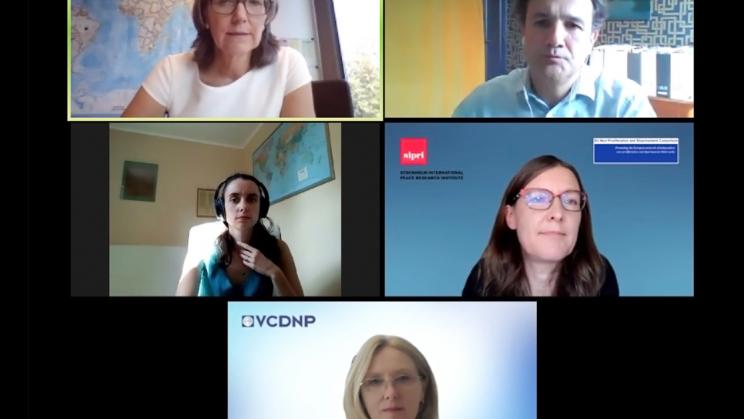
As part of the EU Non-Proliferation and Disarmament Consortium (EUNPDC), SIPRI played an active role during its ninth consultative meeting, held virtually on 10–11 September. The meeting was organized by the Foundation for Strategic Research (FRS) on behalf of the Consortium.
Throughout the two-day meeting, SIPRI experts engaged in several sessions. Dr Sibylle Bauer, Director of Studies, Armament and Disarmament, chaired a panel on ‘Arms control, Non-proliferation and Disarmament Challenges in the Context of the Global Health Crisis’. Dr Vincent Boulanin, Senior Researcher, shared his expertise on emerging military and security technologies as a speaker during the breakout session on ‘Artificial Intelligence in Weapon Systems: Challenges in Regulating Lethal Autonomous Weapon Systems’, and Dr Lucie Béraud-Sudreau, Director of the Arms and Military Expenditure Programme, contributed to a session on key developments in the global and European arms trade.
The virtual meeting was made possible by funding from the European Union.
About the EU Non-Proliferation and Disarmament Consortium
The EUNPDC forms the core of a wider European network of non-proliferation and disarmament think tanks, which the Consortium is responsible for promoting and coordinating. The EUNPDC is managed jointly by six institutes: the Foundation for Strategic Research (FRS), the Peace Research Institute Frankfurt (HSFK/PRIF), the International Affairs Institute (IAI), the International Institute for Strategic Studies (IISS), SIPRI and the Vienna Center for Disarmament and Non-Proliferation (VCDNP).
The aim of the EUNPDC is to encourage discussion of measures to combat the proliferation of weapons of mass destruction and their delivery systems within civil society, particularly among experts, researchers and academics in the EU and third countries. The scope of activities also covers issues related to conventional weapons, including small arms and light weapons. For more information about the Consortium click here.